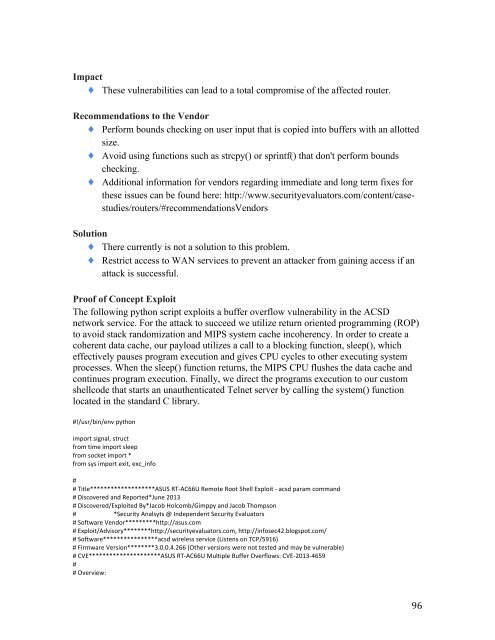ISE SOHO Vulnerability Catalog Published - Independent Security ...
ISE SOHO Vulnerability Catalog Published - Independent Security ...
ISE SOHO Vulnerability Catalog Published - Independent Security ...
Create successful ePaper yourself
Turn your PDF publications into a flip-book with our unique Google optimized e-Paper software.
Impact<br />
♦ These vulnerabilities can lead to a total compromise of the affected router.<br />
Recommendations to the Vendor<br />
♦ Perform bounds checking on user input that is copied into buffers with an allotted<br />
size.<br />
♦ Avoid using functions such as strcpy() or sprintf() that don't perform bounds<br />
checking.<br />
♦ Additional information for vendors regarding immediate and long term fixes for<br />
these issues can be found here: http://www.securityevaluators.com/content/casestudies/routers/#recommendationsVendors<br />
Solution<br />
♦ There currently is not a solution to this problem.<br />
♦ Restrict access to WAN services to prevent an attacker from gaining access if an<br />
attack is successful.<br />
Proof of Concept Exploit<br />
The following python script exploits a buffer overflow vulnerability in the ACSD<br />
network service. For the attack to succeed we utilize return oriented programming (ROP)<br />
to avoid stack randomization and MIPS system cache incoherency. In order to create a<br />
coherent data cache, our payload utilizes a call to a blocking function, sleep(), which<br />
effectively pauses program execution and gives CPU cycles to other executing system<br />
processes. When the sleep() function returns, the MIPS CPU flushes the data cache and<br />
continues program execution. Finally, we direct the programs execution to our custom<br />
shellcode that starts an unauthenticated Telnet server by calling the system() function<br />
located in the standard C library.<br />
#!/usr/bin/env python <br />
import signal, struct <br />
from time import sleep <br />
from socket import * <br />
from sys import exit, exc_info <br />
# <br />
# Title*******************ASUS RT-‐AC66U Remote Root Shell Exploit -‐ acsd param command <br />
# Discovered and Reported*June 2013 <br />
# Discovered/Exploited By*Jacob Holcomb/Gimppy and Jacob Thompson <br />
# *<strong>Security</strong> Analsyts @ <strong>Independent</strong> <strong>Security</strong> Evaluators <br />
# Software Vendor*********http://asus.com <br />
# Exploit/Advisory********http://securityevaluators.com, http://infosec42.blogspot.com/ <br />
# Software****************acsd wireless service (Listens on TCP/5916) <br />
# Firmware Version********3.0.0.4.266 (Other versions were not tested and may be vulnerable) <br />
# CVE*********************ASUS RT-‐AC66U Multiple Buffer Overflows: CVE-‐2013-‐4659 <br />
# <br />
# Overview: <br />
<br />
96



